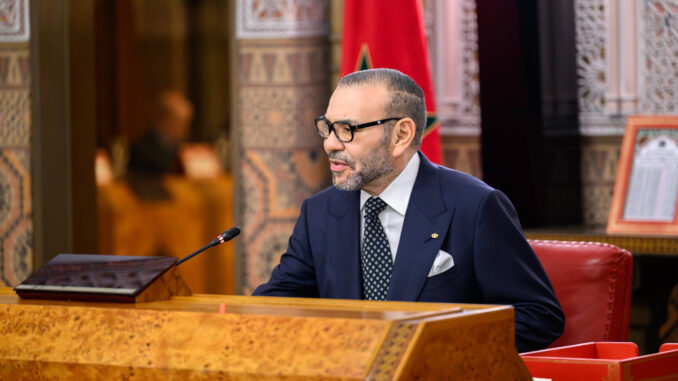
King Mohammed VI chaired this Saturday at the Royal Palace in Casablanca a council of ministers that adopted a number of draft decrees, including one concerning the military sector.
During the council, King Mohammed VI has been briefed on the progress made in the revamp of enterprises in which the state is a stakeholder with the aim of improving governance, regional influence, promoting investments and territorial development, and enhancing competitiveness, Spokesperson for the Royal palace said in a statement.
In her presentation on the ongoing reform of state enterprises, finance and economy minister Nadia Fettah explained that the state stakeholder approach views public enterprises as a strategic lever to consolidate national sovereignty via backing state efforts in an array of critical sectors, such as energy, health, water, food security, the environment, connectivity, and mobility.
She highlighted that the reform aims to restructure the public portfolio, improve its management, and implement key sector reforms to improve public service quality and accelerate the development of the State’s shareholding policy.
The policy also seeks to promote continental and international integration to meet geostrategic challenges and enhance South-South cooperation, especially with African Union countries.
The guidelines’ premier goal is to encourage private investment through cooperation with the private sector as well as boosting economic competitiveness and promoting productive employment.
The rest of guidelines cover ensuring territorial equity, promoting responsible natural resource management, strengthening resilience to climate change as well as improving government and public establishments performance.
Following the adoption of the guidelines, the council also approved a draft organic law amending the regulation on senior appointments.
The draft law proposes the addition of several establishments to the list of strategic public offices, including Grand Atlas Development Agency, the High Authority of Health, Territorial health groupings, among several others.
The proposal stipulates the removal of the higher institute of magistrate from the list of strategic public establishments
The council approved four decrees relating to the military sector in line with King Mohammed VI instructions.
The approval includes a draft decree on the establishment of the creation of two defense industrial acceleration zones aimed at setting up industrial zones to accommodate defense industries related to defense and security equipment, weapons, and ammunitions.
The military related decrees also include amending the special status of teaching researchers in medicine, pharmacy, and dentistry to emphasize scientific excellence and streamline the professional promotion process.
One of the decrees also seeks creating a military attaché position at Morocco’s embassy in Brasilia.
During the Council, King Mohammed VI appointed new chiefs to the helm of several key energy and logistics institutions. These include the Moroccan agency for sustainable energy MASEN, the electricity and water agency ONEE, Airports authority ONDA, ports agency ANP, and the highways company ADM.
